
DARK DAYS IN THE GHOST TOWN OF TOKYO - The Deserted Streets of a Once Vibrant Capital Now Crippled by Power Cut
Now Tokyo, usually so full of life by day and night, has the aura of death about it.
Its lights have been cut, supermarket shelves are empty, there are queues for everything and aftershocks come every day.
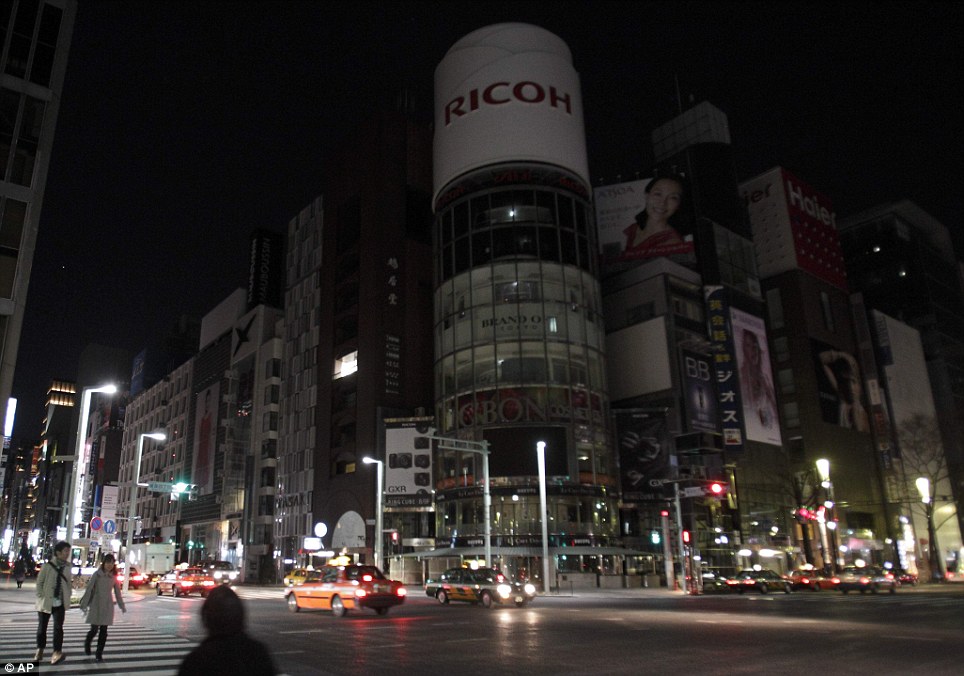
Ghost town: A landmark crossroads in Tokyo's Ginza district is eerily dark and empty as people stay indoors after warnings about a radioactive cloud from the stricken nuclear plant 150 miles away
You could find a few die-hard Brits and other expatriates who wouldn't leave their beers on the counter in the party-time district of Roppongi for any threatening radioactive cloud, but mostly Tokyo has become eerily quiet. Nobody wants to venture out and the streets are deserted.
Everyone, it seems, shares the opinion that something very bad is happening at the Fukushima nuclear power plant 148 miles away, and nobody wants to risk breathing the air.
The British government has joined other nations in urging its citizens to leave the country whatever way they can, including banding together to join a charter flight. Other Britons trapped in the tsunami-stricken Sendai area have been offered the chance of being driven to Tokyo on a chartered bus.
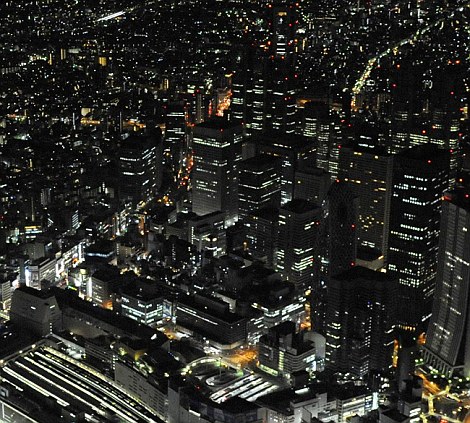
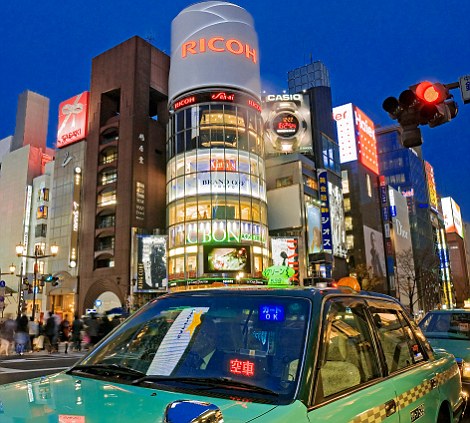
Dimmer: Buildings in Tokyo turn down the lights as part of electricity saving efforts to avoid massive power outages and, right, its usual neon shine
PANIC BUYING AS CHINA SEES HOPE IN SALT
Shelves were stripped of salt in China yesterday by shoppers hoping it would help ward off radiation poisoning from Japan.
They were under the false impression that consuming enough table salt would protect them from contamination.
Rumours also spread that sea salt supplies would be spoiled by radiation.
The wave of panic in Beijing, Shanghai and other parts was said to have been fuelled by text messages via mobile phones.
Prices of salt jumped five or ten-fold – if it could be found at all.
In China, table salt is fortified with potassium iodide to help prevent iodine deficiency, a major cause of learning difficulties.
Potassium iodide can help protect the thyroid gland from radiation injury, but experts say that to get the equivalent of the 130mg dose needed to protect against radiation, someone would need to consume 750 teaspoons of iodised salt every day. A tiny fraction of that salt intake would be fatal.
The Chinese government is trying to counter the fears.
A range of national and provincial agencies issued notices to crack down on hoarding and spreading rumours, and warned of fines of up to £200,000 for inflating prices.
The country’s largest salt producer, China National Salt Industry Corp, issued a statement saying that ample reserves were available and that ‘panic-buying and hoarding is unnecessary’.
But it will be a long journey because the vehicle will have to skirt around the nuclear power plant which stands between Sendai and the capital.
Some Britons have taken their own steps to get out of Tokyo, among them 23-year-old Kezia Poole, an English language teacher from London who has lived in Japan for 13 months.
'I'm flying to the Australian Gold Coast tomorrow,' she said. 'I'll sit back and breathe in the clean, fresh air. It's just not worth waiting around in Tokyo listening to officials telling us this and telling us that.'
She leaves behind a city in fear – a city that was plunged into darkness last night as electricity was cut to conserve power following the massive loss of production at Fukushima.
In Roppongi, the red-light district which is usually thick with crowds, where English girls play hostess to deceitful Japanese husbands, there was hardly a customer in sight.
A British hostess, who would give her name only as Jenny, was already on her way home before midnight, when usually business is thriving.
'They've said I can leave early,' the blonde, heavily wrapped in leather and furs, said in her north country accent. 'A lot of us haven't seen much of the news – how bad is it, then?'
There was no one in the whole of Tokyo who could tell her that, and even if they did, would it be the truth?
For the words coming from the lips of government spokesmen and the Tokyo Electric Company officials who have been holding daily press conferences carry mixed messages: 'We are working at the problem, the radiation is not harmful to humans, you should stay indoors and keep the windows closed, the levels have gone up, the levels have gone down, we've managed to pour water on the rods and that should cool them, the radiation has gone up again.'
Little wonder that many businesses sent their workers home early in the hope of beating the evening rush hour.
The result was long queues at stations for trains, many of which were suddenly cancelled because of fears that rolling blackouts would affect services.
'I just want to be with my children right now,' said an insurance company secretary waiting in the biting cold in a long queue.
'I don't know if my train is running, there are no cabs available and I have no other means of getting home. Everyone wants to leave Tokyo, or at least be home with their families because of the uncertainty.' Some, braving the cold and whatever they feared might be carried in the air, stood in front of public TV sets to watch government officials trying to explain what was happening at Fukushima. Their reaction was sceptical.
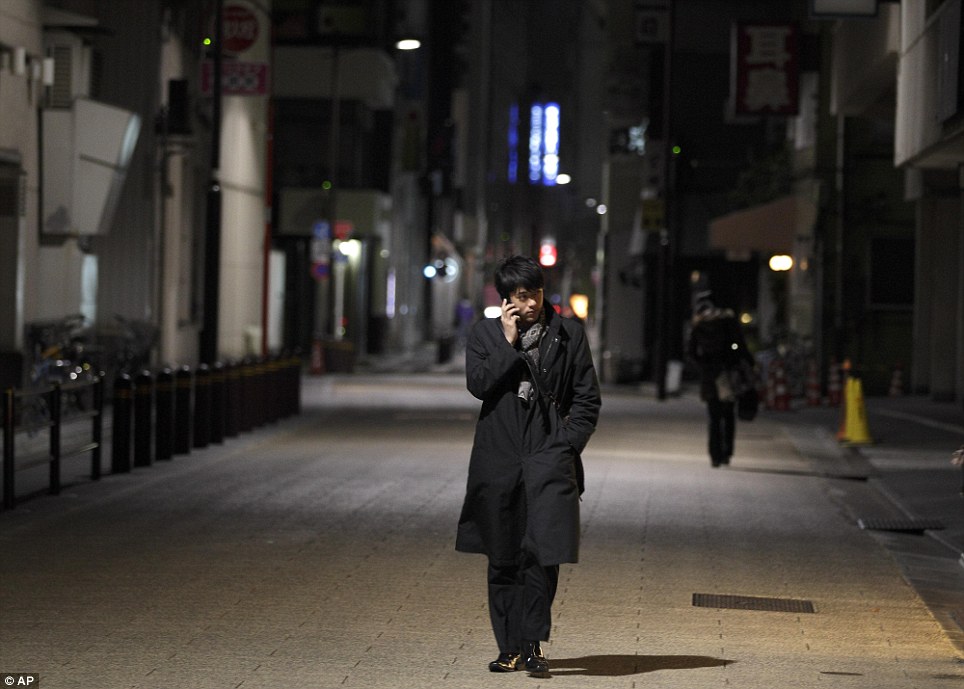
No man's land: The normally bustling streets of the dynamic city are virtually deserted
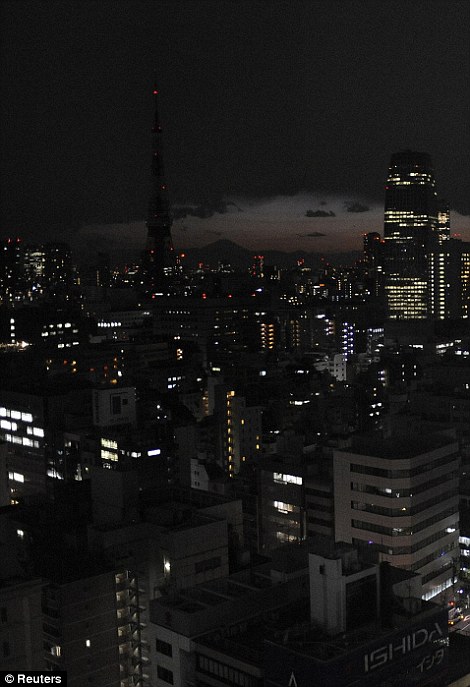
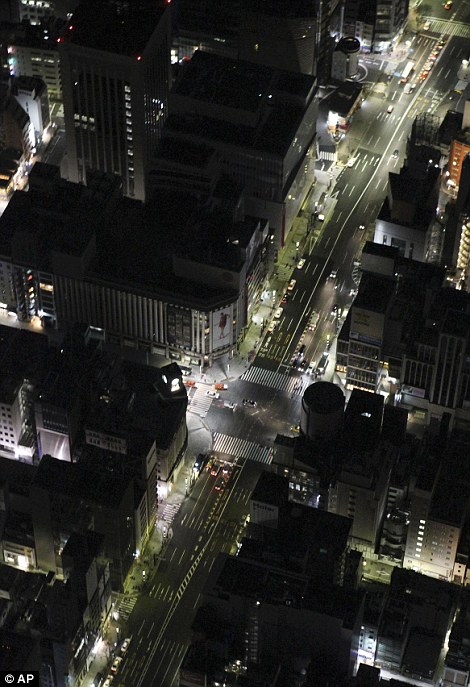
Darkness falls: The usually brilliantly lit skyline has been shrouded in darkness to conserve scant resources of electricity as the crisis continues
WHAT TO DO IF YOU'RE EXPOSED
Once someone has been exposed to a high, prolonged dose of radiation, there is little they can do to reduce the risk of radiation sickness or cancer later in life.
Levels outside the Fukushima plant are still low. But if reactors or waste fuel overheat and explode, a plume of more dangerous radiation could spread for miles.
In this worst case scenario, the danger will come from clouds of radioactive gas and dust, both of which are invisible.
If breathed into the body they would damage DNA and increase the risk of cancer, particularly in the thyroid, lungs, stomach and intestines.
Anyone exposed to radioactive dust should dispose of their clothing as hazardous waste immediately and wash their hair and skin with soap as thoroughly as possible.
Staying indoors can cut exposure to the dust – but will do little to protect against a leak of radioactive gas.
'We're living in modern times. We have robots in the factories, our technology is world famous and yet we end up pouring buckets of water on a nuclear plant,' said one office worker.
'This is taking us back years. We're going to be in darkness for a long time.' Whether he meant darkness at night because of power cuts or darkness because of what lies ahead for the nation, didn't seem to matter.
It is going to be dark in Tokyo and up the coast, where hundreds of thousands shiver and cry for everyone and everything they have lost, for a very long time to come.
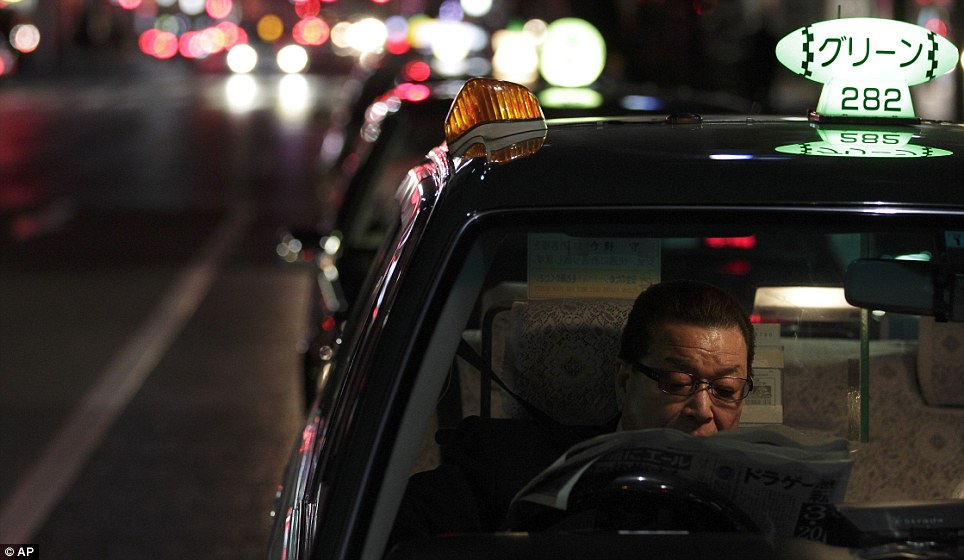
Business is slow: A taxi driver reads a newspaper as he waits for a fare on an empty street
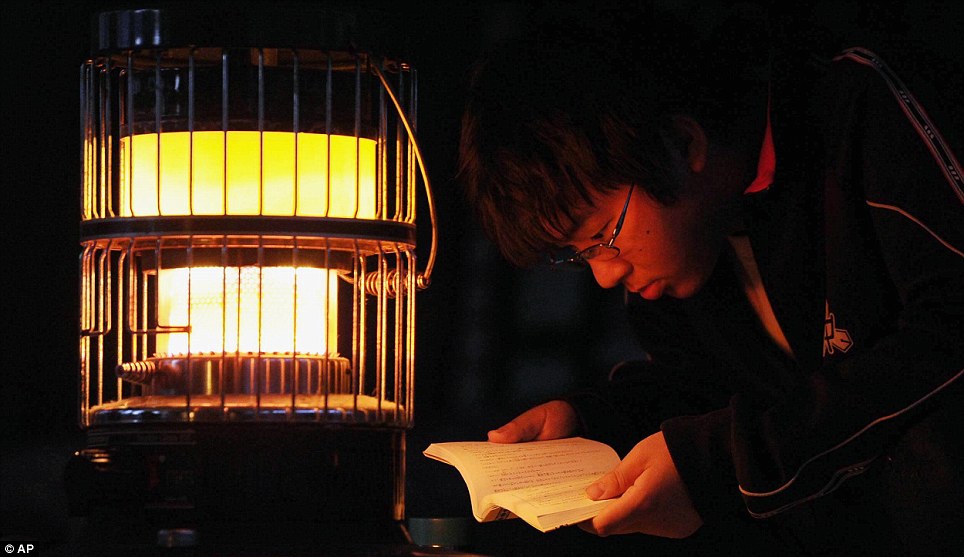
Contrast: An evacuee from a junior high school studies under the light of a kerosene stove at a makeshift shelter in stricken Ofunato
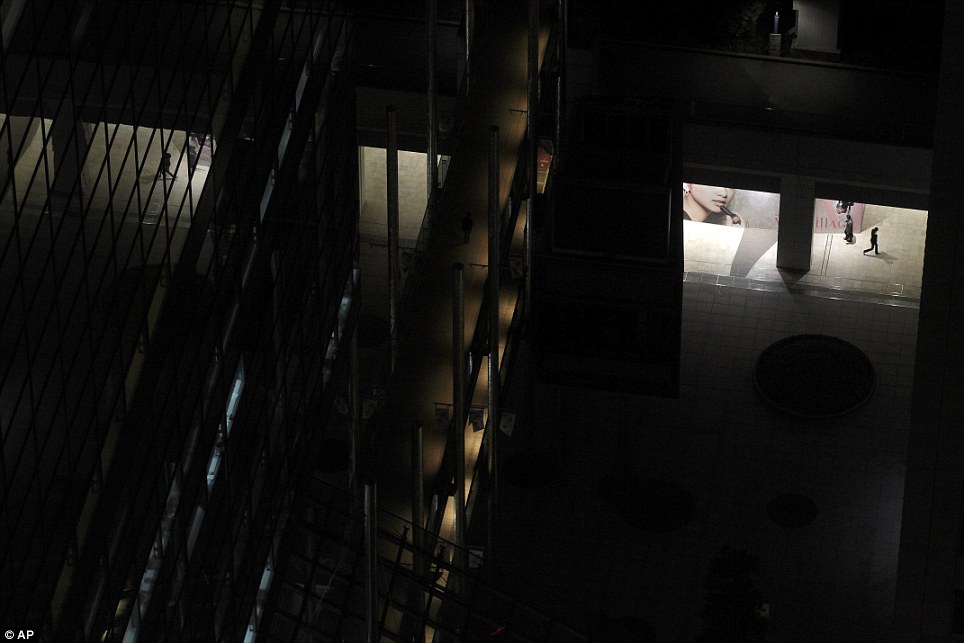
Eerie: People weave their way between blacked out high rises. Tokyo faces at much as six months of blackouts
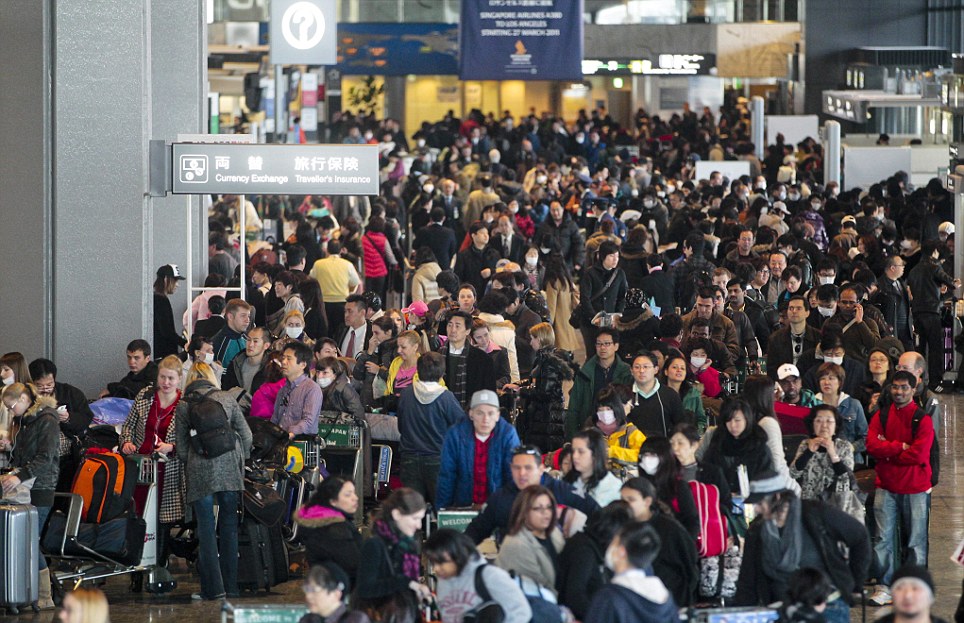
What a contrast: While the streets of Tokyo are empty, the city's airports are packed with residents hoping to get away
March 18, 2011
